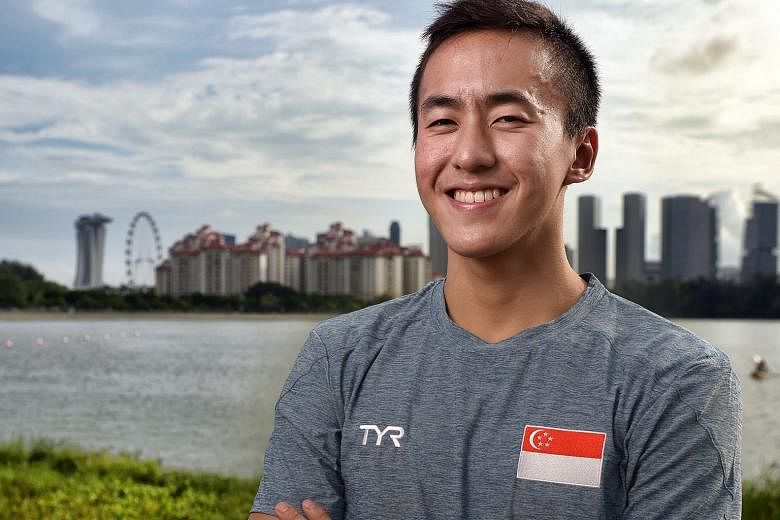Most days, Quah Zheng Wen is a familiar figure in the Kallang area.
He spends almost every morning training at the OCBC Aquatic Centre and returns in the afternoon for another session, knowing there is no short cut to getting faster.
If he is not in the pool, he is working out at the Singapore Sports Institute gym next door.
He said: "I spend so much time here it almost feels like this place is like my home away from home."
So much of sport involves losing. Quah Zheng Wen knows this each time he dives into a chilly pool before sunrise, each time he feels his body ache after a tough gym session, each time he races and touches the wall behind someone faster.
Since January last year, he has competed in about 180 races and endured defeat in many of them. He was the most bemedalled athlete at the Singapore SEA Games but lost five of his nine individual events. He managed seven Fina World Cup medals across four cities last season though none were gold.
Still, the 19-year-old perseveres. He sees these losses not as setbacks but as the black line at the bottom of the pool, guiding him along.
He said: "I'm swimming for myself. I love the sport and I enjoy racing a lot. It's something that's an integral part of me and I can't imagine myself without it."
Next month's Olympic Games in Rio, where he has qualified for the 100m backstroke and the 100m and 200m butterfly events, is both a destination and a pit stop.
-
MY SPECIAL PLACE
Singapore Sports Hub
Postal code: 397632
He is joined by his sister Ting Wen, 23, and Joseph Schooling, 21, in the Republic's smallest swim squad in more than four decades.
While none of Zheng Wen's personal best times in the three events - 54.03 seconds (100m back), 52.25sec (100m fly), 1min 56.26sec (200m fly) - would be good enough to make the final at last year's World Championships, the last major international meet (and benchmark) before the Rio Games, national assistant coach Gary Tan reckoned the teenager is capable of at least one top-eight finish in Brazil.
The 34-year-old Tan, who has trained Zheng Wen for seven years, said: "He's improving all the time and getting faster and faster. I think he'll surprise us in Rio and that will set him up nicely for Tokyo 2020, which has always been the main target for him."
-
SWIMMING
FIRST OLYMPICS
• Neo Chwee Kok (1952, men's 100m & 400m freestyle, third in both heats and did not advance)
BEST PERFORMANCE
• Tao Li (2008, women's 100m butterfly, fifth in 'A' final)
A HISTORY
• No sport has produced more Singapore Olympians - 38.
• Ang Peng Siong won the 100m free 'B' final in Los Angeles 1984. Tao Li set an Asian record in the 100m fly en route to a fifth-place finish in Beijing 2008.
• This time, all eyes are on Joseph Schooling as he attempts to win the Republic's first swimming medal.
The 21-year-old is one of only four men to post a sub-51sec 100m fly time in the post-supersuit era.
• Quah Zheng Wen is another to watch, having matched Schooling in meeting three 'A' qualifying marks.
• His sister Ting Wen completes the squad of three, which is the smallest since 1972 (also three).
• No Singaporean made the cut on 'B' times this time. The bulk of the 900 spots are filled by 'A' qualifiers, relay squads and universality places to ensure representation from countries that did not qualify.
TEAM SINGAPORE
Men
• Joseph Schooling (100m free, 100m and 200m fly)
• Quah Zheng Wen (100m backstroke, 100m and 200m fly)
Women
• Quah Ting Wen (100m fly)
WHEN THEY COMPETE
Aug 6-12
There are no short cuts to making the grade as a world-class swimmer though, only pain and solitude.
Zheng Wen is in the water at 5.30am five mornings a week and swims between 50km and 60km over 10 sessions weekly at the OCBC Aquatic Centre.
"It's such a lonely feeling. So cold, so few people, the arena's all dark," he said. "You will dread it no matter how long you've been doing it."
Yet what he fears even more is the notion of slacking off. "Especially at the end of the week, you really feel the muscle fatigue. The arms just feel so heavy and coming into the last wall you're just struggling for breath... It's a battle of the mind... I just picture myself going up against some of the world's fastest swimmers.
"Would these guys give up during a set like this? And the answer is always no. Hell, if they can do it, I can too."
More speed requires more power and that means hitting the weights, something he only began seriously in January. He weighed 62kg before the SEA Games and has since added about 6kg of muscle to his lean 1.79m frame and the evidence is clear - a ripped Zheng Wen sporting a six-pack appears on the cover of August's Men's Health magazine.
He said: "I'm stronger than I've ever been and I can feel that strength in the water."
Yet his greatest asset comes elsewhere. While he is shorter than most elite swimmers, his technique more than compensates for it, noted Ryan Hodierne, a biomechanist at the Singapore Sports Institute.
For instance, in the butterfly, each stroke is accompanied by two underwater dolphin kicks for propulsion.
"Most swimmers, even the top ones, can only generate half or three-quarters the torque on their second kick," explained the South African-born Briton Hodierne, who worked with the South African swim team that won two golds at the 2012 Games.
"But Zheng's second kick is almost as strong as the first. That's very rare and hard to coach. It helps him cut through the water more efficiently."
Aside from his lower limbs, equally crucial is what goes on inside Zheng Wen's head.
Tan, a two-time Olympian, said: "He really hates to lose. Sometimes we have to remind him to go easy in a heat and save himself for the more important races."
This will be Zheng Wen's second Summer Games - he did not progress beyond the heats in either the 200m back or 400m individual medley in London - and he is raring to go.
"I'm stronger, older and faster. I'm ready for this," he said.
His first event, the 100m back heats, is nine days away on Aug 7.
In the meantime, there are more testing practice sessions, more painful repetitions, more racing rehearsals before Zheng Wen faces 38 of the planet's finest backstrokers. He will be slower than many but faster than some. In a single race at the Olympics, you can lose, yet also win.


